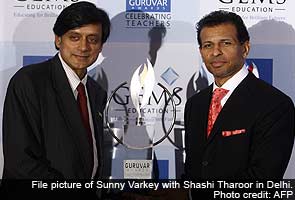Entrepreneur seeks to offer quality education at fraction of cost
London: When Sunny Varkey was 4 years old, his parents left him in the care of family members in his native India while they “went to seek green pastures” teaching English as a second language in Dubai in the late 1950s, in what was then a sleepy British protectorate on the southeast coast of the Persian Gulf.
“My parents were brought over by Easa Saleh al-Gurg, who later became the United Arab Emirates ambassador to Great Britain,” he said in a recent interview in London. “Our family came with empty hands, but in those days the UAE was a land of opportunity.”
Initially his parents’ pupils came almost exclusively from local families, but the discovery of oil in Dubai in 1966 brought an influx of foreign workers, many from the Asian subcontinent. Two years later, Varkey’s parents opened Our Own English High School, the first private school in Dubai for Indian students. Meanwhile Varkey was completing his own education, first at a Catholic boarding school in India and then in Dubai, followed by a year at a college on the Isle of Wight, in Britain.
“I did not study much,” Varkey said. He joined his parents in 1970, just before Dubai gained its independence from Britain, and took over the company in 1980, starting with his parents’ single school in Dubai.
Although he never attended university himself, he now runs GEMS Education, which claims to be the largest private provider of K-12 education in the world, and presides over a network of about 70 schools operating in 18 countries, from the United States to Britain, Egypt to China. His two sons, Dino and Jay, now hold senior positions at the company, making it a three-generation endeavor.
In addition to owning schools with a total of 130,000 students, the Dubai-based company also manages schools and school systems on government contracts and acts as consultants in the Philippines and several African countries.
Despite his company’s growing influence, Varkey has long avoided the media spotlight. But with more recent moves into Britain and the United States, that seems to have changed. In February the company hosted the first Global Education and Skills Forum in Dubai, bringing together 500 delegates to discuss the relationship between governments and the private sector. It included former President Bill Clinton, who was recently named honorary chairman of the Varkey GEMS Foundation, the company’s philanthropic arm.
Varkey cited the attendance of Clinton and former Prime Minister Tony Blair of Britain as evidence of his ambition to turn the annual gathering “into the Davos of education.”
Varkey’s increasing prominence has also brought greater scrutiny both of his business model and his educational philosophy. From the beginning, the GEMS schools in Dubai took for granted a kind of ethnic segregation.
“We had an Indian school, we had a Pakistani school. We also opened a British school,” where “we had key British teachers – the head of school, head of curriculum, and so on, as well as a number of Asian teachers,” Varkey said.
The company remains the largest employer of British teachers outside of the United Kingdom, as well as the largest employer of Indian teachers outside of India. Pay scales at each school are linked not to the local economy or the nature of the school, but to salaries in a teacher’s home country.
And while the company boasts that it provides the same high-quality education at its least-expensive schools (where fees are approximately 750 dollars a year) as it does at premium schools (where fees can exceed 40,000 dollars), there has been criticism at both ends of the scale.
GEMS announced last year plans to open six private schools in Britain charging between 8,000 and 12,000 pounds – or between 12,000 dollars and 18,000 dollars – a year. That works out to roughly one-half to one-third of the price of more prestigious private schools like Eton or Winchester.
The head of Brighton College, in Sussex, which charges more than 18,000 pounds a year and has no relation to GEMS, said that the only way to cut costs would be to increase class sizes. “Any school that thinks it can stint on teachers’ salaries and class sizes while still offering a first-class education is kidding itself,” Richard Cairns, Brighton College’s headmaster, told The Guardian.
When GEMS first came to Britain in 2004, it raised class sizes by as much as a third at a school in Milton Keynes, and parents complained.
In 2008, parents with children at the GEMS Jumeirah Primary School in Dubai wrote to Varkey after class sizes were increased. There have also been complaints about sharp increases in school fees and the closure of the Westminster School in Dubai after the country’s school regulator would not raise a cap on private school tuition.
Jane Donovan’s two daughters, now ages 10 and 7, have attended GEMS Wellington since they moved to Dubai three years ago. In Britain, they had attended a private school with similar tuition fees.
“I can see how it would be a struggle for parents who, for the first time, have to pay for education because there is no public option for them,” she said, referring to the fact that expatriates in the UAE do not have the same access to free public education that local citizens do, or that they would have had back in their home countries.
“But we were paying anyway back home, and we were very happy with the quality of teaching and school grounds at GEMS,” Donovan said.
When challenged on class size, Varkey pointed to airlines, which offer first class, business and economy seats on the same plane, or to Mercedes, which produces several classes of cars.
“The difference is facilities,” he said. At Our Own English High School, an Indian girls’ school in Dubai with 10,000 students, tuition is just 2,000 dollars a year. “But every graduate of that school went to university,” he said.
One of the company’s premium schools, also in the United Arab Emirates, offers students an Olympic running track, planetarium and swimming pool for their 40,000 dollars a year.
Class sizes in the company’s less expensive schools can reach 30 or 35 students. But Varkey says his customers know what they are getting. “Indian middle-class parents are not the same as middle-class parents in the UK,” he said. Indian parents “want their children to get good grades to go on to a good university. They don’t place much importance on tennis or golf.”
“You can’t rely on a fee structure to determine the quality of a school,” said Roopa Chan, a Dubai-based teacher who had taught English at a GEMS affiliate, Our Own Indian School. “Maybe the infrastructure is good, and it’s a posh environment, but that doesn’t always guarantee greater quality.”
Varkey has ambitious plans for Britain, the United States and Europe; in September GEMS will open a school in Etoy, Switzerland, following the International Baccalaureate curriculum. However, the legion of South Asian expatriates who have moved overseas remain his core customers. “They don’t have social security, so they have to work their butts off to achieve,” Varkey said.
As long as globalization continues, “our business will remain recession proof,” he said. He has just completed a $550 million round of financing to help the company continue to expand into countries where “we can deliver a higher quality of education than the state can provide.”


